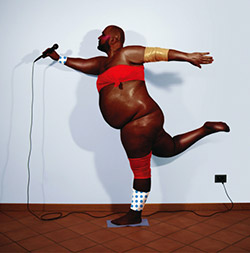On dating apps and websites it starts when you fill out your profile. Other times it’s the first point to nail in negotiation. And, for some of us it can be quite hard to answer. “Are you top or bottom?”
One complicating (or complicated!) thing for me is that I come from a Southeast Asian country where the representation of alternate sexual identities and performances is extremely low… almost non-existent in my upbringing. My learning really came from the internet, where I watched pornography, chatted with strangers in chat rooms, and later was able to access alt-sex communities like Recon, Fetlife and Grindr.
IS IT BINARY?
Are you top or bottom?
Dom or sub?
0 or 1?
Personally, I never know how to answer.
In search of possible explanation, I came across Wikisexuality: Rethinking sexuality in the cyberspace by L Ayu Sawaswati in Sexualities Vol 16.
In this article, Sawaswati re-positions our view, from the traditional binary approach (or categorized and boxed approach) to sexuality as A, B, C and D. She situates sexuality within cyberspace, and suggests fluid definitions that are constantly evolving, and redefined, by internet users.
Looking from that angle, it’s a reminder of how any form of identities, specifically sexual identities in the context of this article, have never had a rigid definition. The boundaries are constantly challenged, changed and shaped depending on all the circumstances and the way in which we interact as individuals and collectives. Such porousness is, perhaps, the essence and the beauty of the human species.
… considers cyberspace as its own epistemic point of reference and proposes ‘wikisexuality’, a new category of sexuality in cyberspace that takes into account the fluidity of sexuality, highlights the constant formation of sexual identities, and reflects the non-linear, postmodern, and chaotic formation of sexuality that moves us beyond the mono versus multiple categories of sexuality and beyond the nature versus nurture debate by evoking the notion of sexuality as constantly shifting with every encounter.
(Saraswati 2013)
FLUIDITY, PERFORMANCE AND PLAY
Further, the author explains, if we could approach the discussion of “sexuality as fluid, unlabelled and non-binary”, it provides us the potential to view sexuality as a form of performative, improvisational, almost theatrical and playful exploration.
 In this understanding of fluidity of sexuality in cyberspace, the internet users across the world constantly seek hookups and chats, and collaboratively create content, which feeds into interpersonal interactions (be it sexual or non-sexual). In these everyday intense online interactions, the traditional dominant discourse of sexuality just doesn’t work. You can’t put people into boxes of top and bottom, or dom and sub, if we are looking at all the users and interactions happening every day in cyberspace. You could be a person who is interested in exploring your submissive self, but still want to be the one who has control over where to have dinner. Or you could be the person who likes to be Top during vanilla sex but a fistee during a D/s scene.
In this understanding of fluidity of sexuality in cyberspace, the internet users across the world constantly seek hookups and chats, and collaboratively create content, which feeds into interpersonal interactions (be it sexual or non-sexual). In these everyday intense online interactions, the traditional dominant discourse of sexuality just doesn’t work. You can’t put people into boxes of top and bottom, or dom and sub, if we are looking at all the users and interactions happening every day in cyberspace. You could be a person who is interested in exploring your submissive self, but still want to be the one who has control over where to have dinner. Or you could be the person who likes to be Top during vanilla sex but a fistee during a D/s scene.
What I suggest here, therefore, is considering wikisexuality as a subversive mode of articulating and playing with one’s sexual identity within the structure of cyber-space. Play allows us to take notice of our agency… we choose the contexts for our play (Hans, 1981: 14) while recognizing that this agency is located within a particular discourse, “an ecology of communication” (Altheide, 1995) and therefore is governed by it.
…it is in being able to playfully claim that I am wikisexual that I could then challenge existing categorization of sexuality and make visible the fluidity of sexuality. This practice of reframing how we consider sexuality in cyberspace is an exercise of peeling another layer of that reality and accessing another realm or dimension of reality that otherwise would have remained unknown.
(Saraswati 2013)
If that question, “are you a top or bottom?” always stumps you, perhaps next time you can say: “I am much more complex, mysterious and interesting than that”, with “Wikisexuality” backing you up. Be confident, get out there, have some of that kinky performative play that you have been eager for!
FURTHER READING
• Altheide D (1995) An Ecology of Communication: Cultural Formats of Control. Hawthorne, NY: Aldine de Gruyter.
• Hans J (1981) The Play of the World. Amherst: University of Massachusetts Press.
